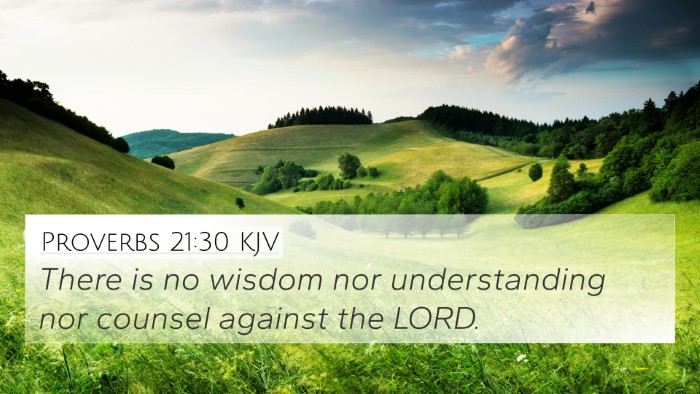Old Testament
Genesis Exodus Leviticus Numbers Deuteronomy Joshua Judges Ruth 1 Samuel 2 Samuel 1 Kings 2 Kings 1 Chronicles 2 Chronicles Ezra Nehemiah Esther Job Psalms Proverbs Ecclesiastes Song of Solomon Isaiah Jeremiah Lamentations Ezekiel Daniel Hosea Joel Amos Obadiah Jonah Micah Nahum Habakkuk Zephaniah Haggai Zechariah MalachiNahum 1:9 Similar Verses
Nahum 1:9 Cross References
What do ye imagine against the LORD? he will make an utter end: affliction shall not rise up the second time.
Uncover the Rich Themes and Topics of This Bible Verse
Listed below are the Bible themes associated with Nahum 1:9. We invite you to explore each theme to gain deeper insights into the Scriptures.
Nahum 1:9 Cross Reference Verses
This section features a detailed cross-reference designed to enrich your understanding of the Scriptures. Below, you will find carefully selected verses that echo the themes and teachings related to Nahum 1:9 KJV. Click on any image to explore detailed analyses of related Bible verses and uncover deeper theological insights.
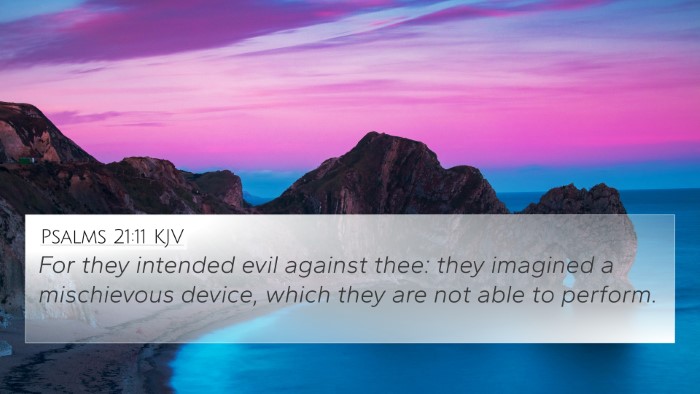
Psalms 21:11 (KJV) »
For they intended evil against thee: they imagined a mischievous device, which they are not able to perform.

Psalms 33:10 (KJV) »
The LORD bringeth the counsel of the heathen to nought: he maketh the devices of the people of none effect.
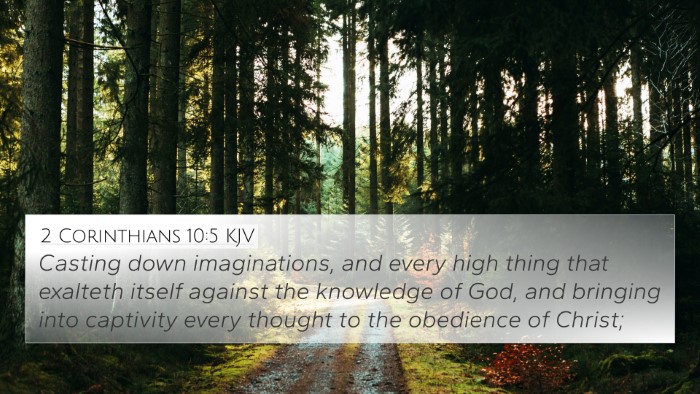
2 Corinthians 10:5 (KJV) »
Casting down imaginations, and every high thing that exalteth itself against the knowledge of God, and bringing into captivity every thought to the obedience of Christ;

Nahum 1:11 (KJV) »
There is one come out of thee, that imagineth evil against the LORD, a wicked counsellor.
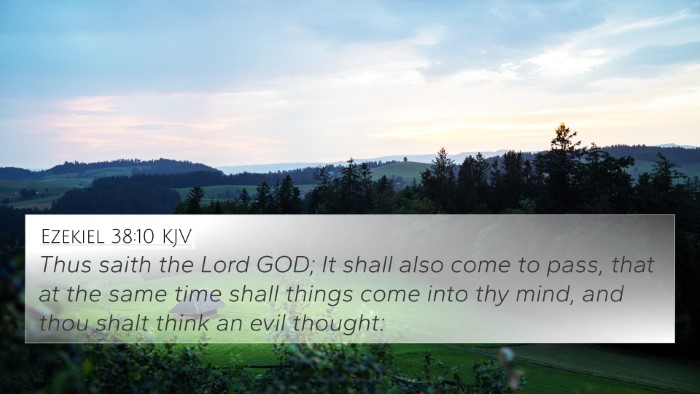
Ezekiel 38:10 (KJV) »
Thus saith the Lord GOD; It shall also come to pass, that at the same time shall things come into thy mind, and thou shalt think an evil thought:
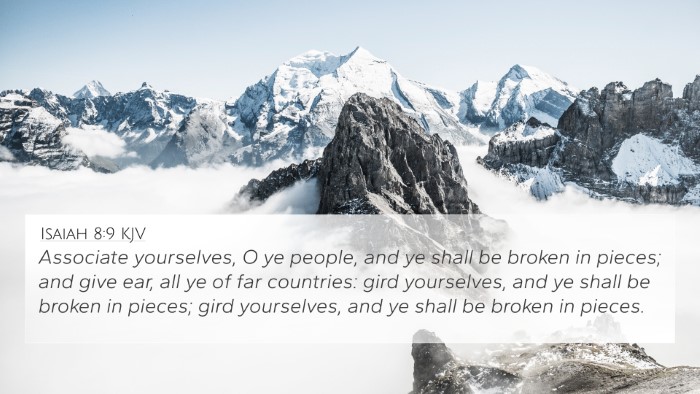
Isaiah 8:9 (KJV) »
Associate yourselves, O ye people, and ye shall be broken in pieces; and give ear, all ye of far countries: gird yourselves, and ye shall be broken in pieces; gird yourselves, and ye shall be broken in pieces.

1 Samuel 26:8 (KJV) »
Then said Abishai to David, God hath delivered thine enemy into thine hand this day: now therefore let me smite him, I pray thee, with the spear even to the earth at once, and I will not smite him the second time.

Acts 4:25 (KJV) »
Who by the mouth of thy servant David hast said, Why did the heathen rage, and the people imagine vain things?

1 Samuel 3:12 (KJV) »
In that day I will perform against Eli all things which I have spoken concerning his house: when I begin, I will also make an end.
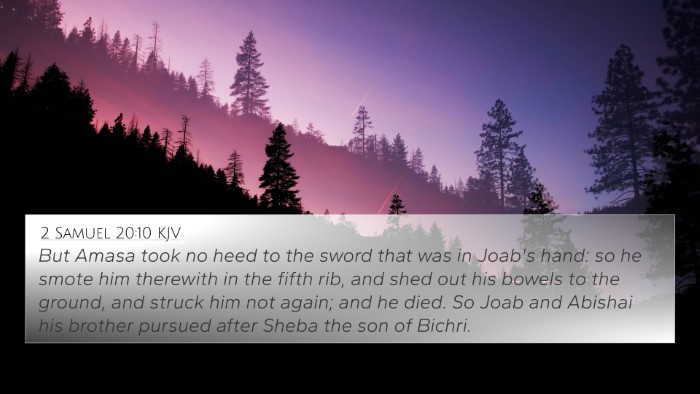
2 Samuel 20:10 (KJV) »
But Amasa took no heed to the sword that was in Joab's hand: so he smote him therewith in the fifth rib, and shed out his bowels to the ground, and struck him not again; and he died. So Joab and Abishai his brother pursued after Sheba the son of Bichri.
Nahum 1:9 Verse Analysis and Similar Verses
Nahum 1:9 - Understanding the Verse
Bible Verse: Nahum 1:9 - "What do ye imagine against the LORD? he will make an utter end: affliction shall not rise up the second time."
Meaning and Interpretation
Nahum 1:9 presents a profound message of God’s sovereignty and the finality of His judgment. This verse addresses the imaginations and schemes of those who might question God's authority or assume they can defy Him without consequence. Both Matthew Henry and Albert Barnes emphasize the certainty of God's judgment and the inescapable fate that befalls those who rise against Him.
Contextual Analysis
Nahum delivers a prophetic message regarding the downfall of Nineveh, the capital city of the Assyrian Empire, known for its oppression and violence against God’s people. This context provides a backdrop for understanding the gravity of God’s response to injustice.
Key Insights from Public Domain Commentaries
- Matthew Henry: He emphasizes that the imaginations against God reflect the arrogance of man. The verse serves as a reminder that God's judgments are certain and will bring a complete end to affliction caused by wickedness.
- Albert Barnes: He highlights the prophetic nature of the statement, suggesting that the language indicates a comprehensive defeat of the adversaries of God. The phrase "utter end" underscores the finality of God's actions against those who oppose Him.
- Adam Clarke: Clarke notes that this verse also serves as a warning to nations and individuals alike. The suggestion that "affliction shall not rise up the second time" indicates a complete eradication of the source of oppression.
Biblical Cross-References
To enhance understanding, here are several Bible verses that relate strongly to Nahum 1:9:
- Isaiah 10:25: "For yet a very little while, and the indignation shall cease, and mine anger in their destruction." - This verse reflects God's definitive judgment and the end of affliction.
- Zephaniah 3:15: "The LORD hath taken away thy judgments, he hath cast out thine enemy: the king of Israel, even the LORD, is in the midst of thee: thou shalt not see evil any more." - It emphasizes the removal of oppression by God's hand.
- Revelation 21:4: "And God shall wipe away all tears from their eyes; and there shall be no more death, neither sorrow, nor crying, neither shall there be any more pain: for the former things are passed away." - This promise of eternal peace mirrors the hope offered in Nahum.
- Micah 5:9: "Thine hand shall be lifted up upon thine adversaries, and all thine enemies shall be cut off." - Indicates the ultimate victory of God's people over their foes.
- Obadiah 1:15: "For the day of the LORD is near upon all the heathen: as thou hast done, it shall be done unto thee: thy reward shall return upon thine own head." - Affirms the concept of divine retribution against those who oppose God.
- Lamentations 3:34-36: "To crush under his feet all the prisoners of the earth, to turn aside the right of a man before the face of the most High, to subvert a man in his cause, the Lord approveth not." - A declaration that God does not overlook injustice.
- Psalms 9:16: "The LORD is known by the judgment, which he executeth: the wicked is snared in the work of his own hands." - Speaks to the inevitability of God's judgment upon the wicked.
Thematic Connections
The themes in Nahum 1:9 can be interlinked with various other scriptures to illustrate God's justice, judgment, and the assurance of His protection over His people:
- Divine Sovereignty: Isaiah 46:10 - Declares the end from the beginning, affirming God's control over history.
- Finality of Judgment: Hebrews 9:27 - "And as it is appointed unto men once to die, but after this the judgment." - Reflects the certainty of divine judgment after life.
- Hope for the Oppressed: Psalms 34:19 - "Many are the afflictions of the righteous: but the LORD delivereth him out of them all." - Assurance that God delivers His faithful ones.
- Call for Righteousness: 2 Chronicles 7:14 - "If my people, which are called by my name, shall humble themselves, and pray, and seek my face, and turn from their wicked ways; then will I hear from heaven..." - Highlights the necessity for repentance and turning to God.
Conclusion
Nahum 1:9 serves not only as a warning to those who might oppose God but also as a source of encouragement for believers who suffer injustice. The cross-references provide a broader theological understanding of God's unchanging nature as a righteous judge who ultimately delivers justice and peace. By studying inter-Biblical dialogues and the connections between these verses, one can gain a comprehensive insight into the nature of God's character and His covenant with His people.
Tools for Bible Cross-Referencing
For deeper study and exploration of the connections between Bible verses, utilizing tools for Bible cross-referencing can be invaluable:
- Bible concordances for finding keywords and themes.
- Cross-reference Bible guides for organized scripture comparisons.
- Online Bible reference resources that compile thematic connections.
- Cross-reference Bible study methods for deeper theological analysis.



